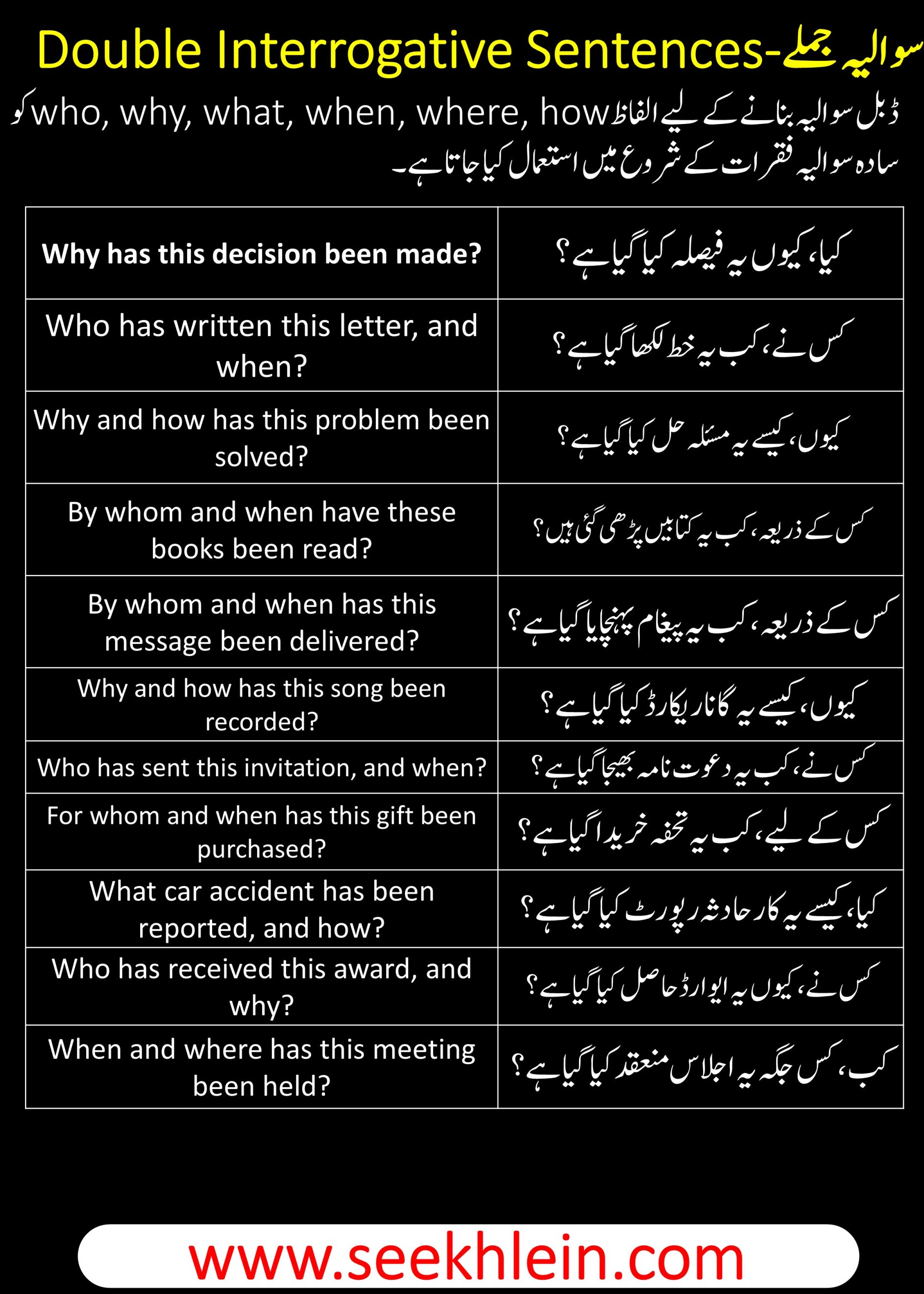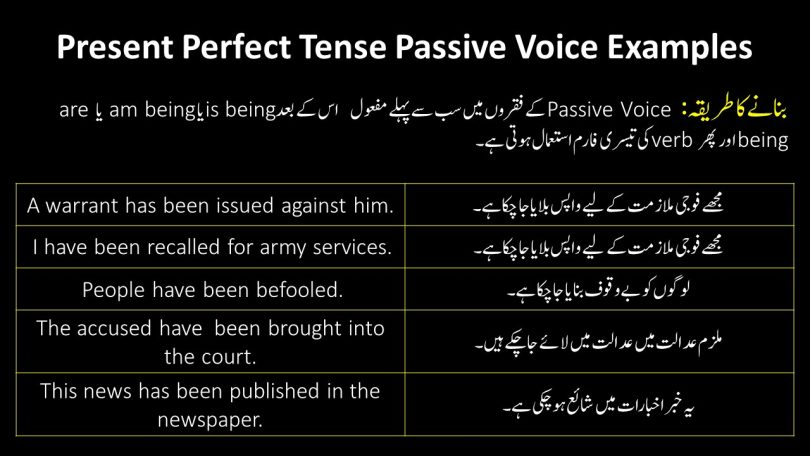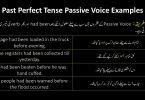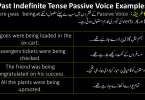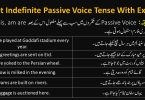Introduction:
In this blog, you will learn to Present Perfect Passive Tense with Urdu To English Examples. If you are a beginner and want to improve your English grammar, you must learn tense. Tenses are key to the English language, without learning Tenses you can’t improve your English grammar and speaking. There are a total of 8 Passive tenses in English grammar. In the first section, you will learn the Present Perfect Passive tense introduction. In 2nd section, you will learn simple sentences of Present Perfect passive voice tense. In 3rd section, you will learn negative sentences of the Present Perfect Passive tense with Urdu Examples. 4th section of this blog you will learn to Present Perfect Passive Voice Interrogative sentences with Urdu to English examples.
For More lessons Click Here;
Present Indefinite Passive Tense With Urdu To English Examples
Present Continuous Passive Tense With Urdu To English Examples
Present Perfect Passive Tense With Urdu To English Examples
بنانے کا طریقہ: Passive Voice کے فقروں میں سب سے پہلے مفعو ل اس کے بعد is beingیا am beingیا are beingاور پھر verb کی تیسری فارم استعمال ہوتی ہے۔
Present Perfect Passive Voice Tense With Simple Sentences Examples
In the below table, you will learn to Present Perfect Passive Voice Tense with Simple Urdu to English sentences. Just scroll down and learn and learn these sentences
| Arrangements have been made to open a separate college for girls. | منصوبے کو آخری شکل دی جا چکی ہے۔ |
| The project has been given final shape. | اس کے خلاف وارنٹ جار ی کر دیا گیا ہے۔ |
| A warrant has been issued against him. | مجھے فوجی ملازمت کے لیے واپس بلایا جا چکا ہے۔ |
| I have been recalled for army service. | مجھے فوجی ملازمت کے لیے واپس بلایا جا چکا ہے۔ |
| People have been befooled. | لوگوں کو بے وقوف بنا یا جا چکا ہے۔ |
| The accused have been brought into the court. | ملزم عدالت میں عدالت میں لائے جا چکے ہیں۔ |
| This news has been published in the newspaper. | یہ خبر اخبارات میں شائع ہو چکی ہے۔ |
| The thief has been beaten severely. | چور کو سخت پیٹا جا چکا ہے۔ |
| Many books have been written on this project. | اس موضوع پر بہت سی کتابیں لکھیں جا چکی ہیں۔ |
| The gun has been loaded. | بندوق میں گولی بھری جا چکی ہے۔ |
| A big amount has been saved this year. | اس سال ایک بھاری رقم بچائی گئی ہے۔ |
| The rotten egg has been thrown. | گندا انڈا پھینکا جا چکا ہے۔ |
| The dirty clothes have been washed. | میلے کپڑے دھوئے نہیں جا چکے ہیں۔ |
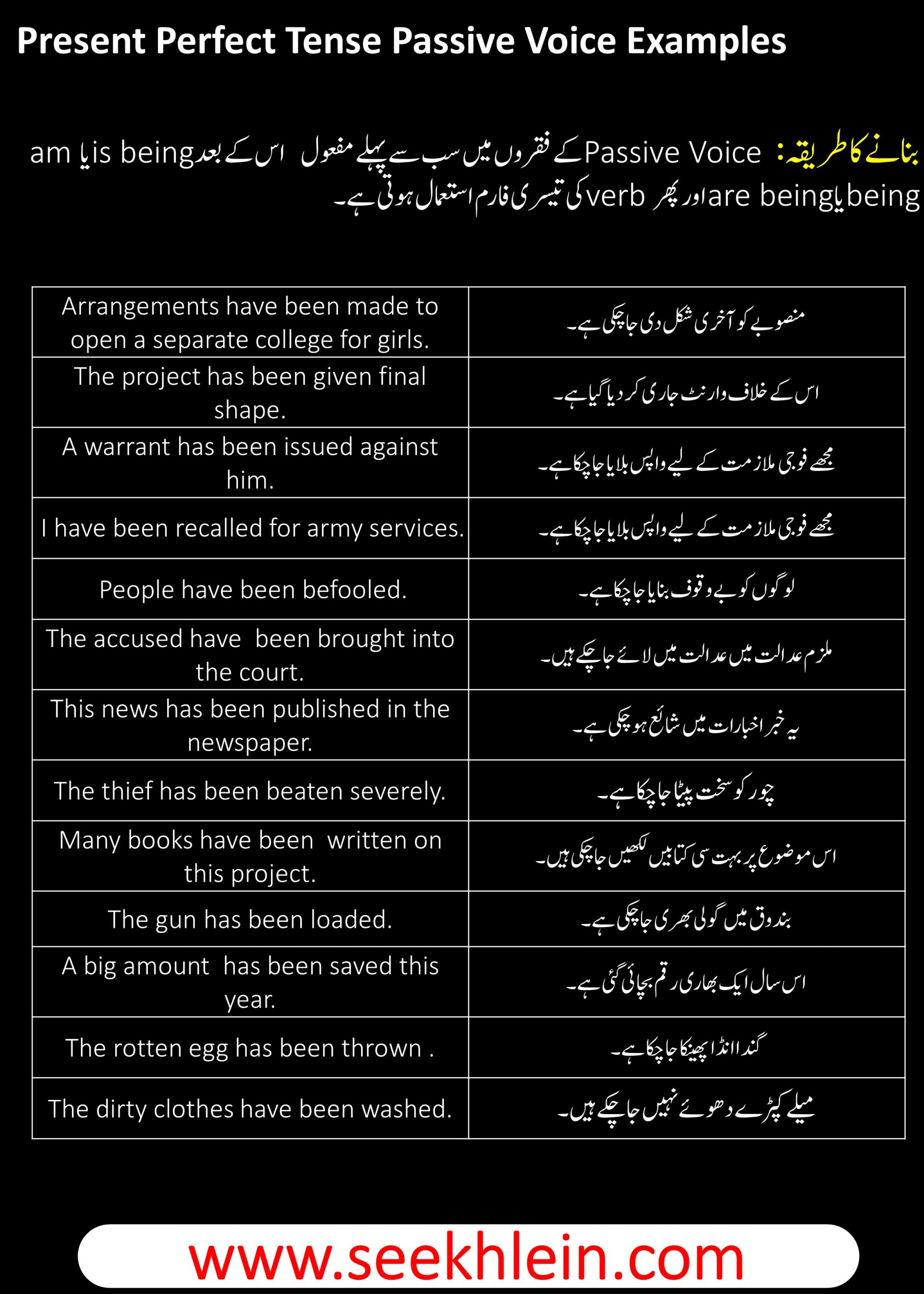
Present Perfect Passive Voice Tense With Simple Sentences Examples
Present Perfect Passive Voice Tense With Negative Sentences Examples
In the table below, you will learn to Present Perfect Passive Voice Negative Sentences with Simple Urdu to English sentences. Just scroll down and learn and learn these sentences.
Negative Sentences-منفی جملے
منفی بنانے کے لیے has been اور have been کے بعد not کا استعمال کیا جاتا ہے۔
| The food has not been cooked. | کھانا نہیں بنایا گیا ہے۔ |
| The letter has not been written. | خط نہیں لکھا گیا ہے۔ |
| The books have not been read. | کتابیں نہیں پڑھی گئی ہیں۔ |
| The room has not been cleaned. | کمرہ صاف نہیں کیا گیا ہے۔ |
| The trees have not been cut down. | درخت نہیں کاٹے گئے ہیں۔ |
| The problem has not been solved. | مسئلہ حل نہیں کیا گیا ہے۔ |
| He/She has not been punished. | اُسے سزا نہیں دی گئی ہے۔ |
| The questions have not been asked. | سوالات نہیں پوچھے گئے ہیں۔ |
| The photos have not been taken. | تصاویر نہیں کھینچی گئی ہیں۔ |
| The patient has not been treated. | مریض کا علاج نہیں کیا گیا ہے۔ |
| The project has not been completed. | پروجیکٹ مکمل نہیں کیا گیا ہے۔ |
| The invitation has not been sent. | دعوت نامہ نہیں بھیجا گیا ہے۔ |
| The homework has not been done. | ہوم ورک نہیں کیا گیا ہے۔ |
| The movie has not been watched. | فلم نہیں دیکھی گئی ہے۔ |
| The decision has not been made. | فیصلہ نہیں کیا گیا ہے۔ |
| The message has not been delivered. | پیغام نہیں پہنچایا گیا ہے۔ |
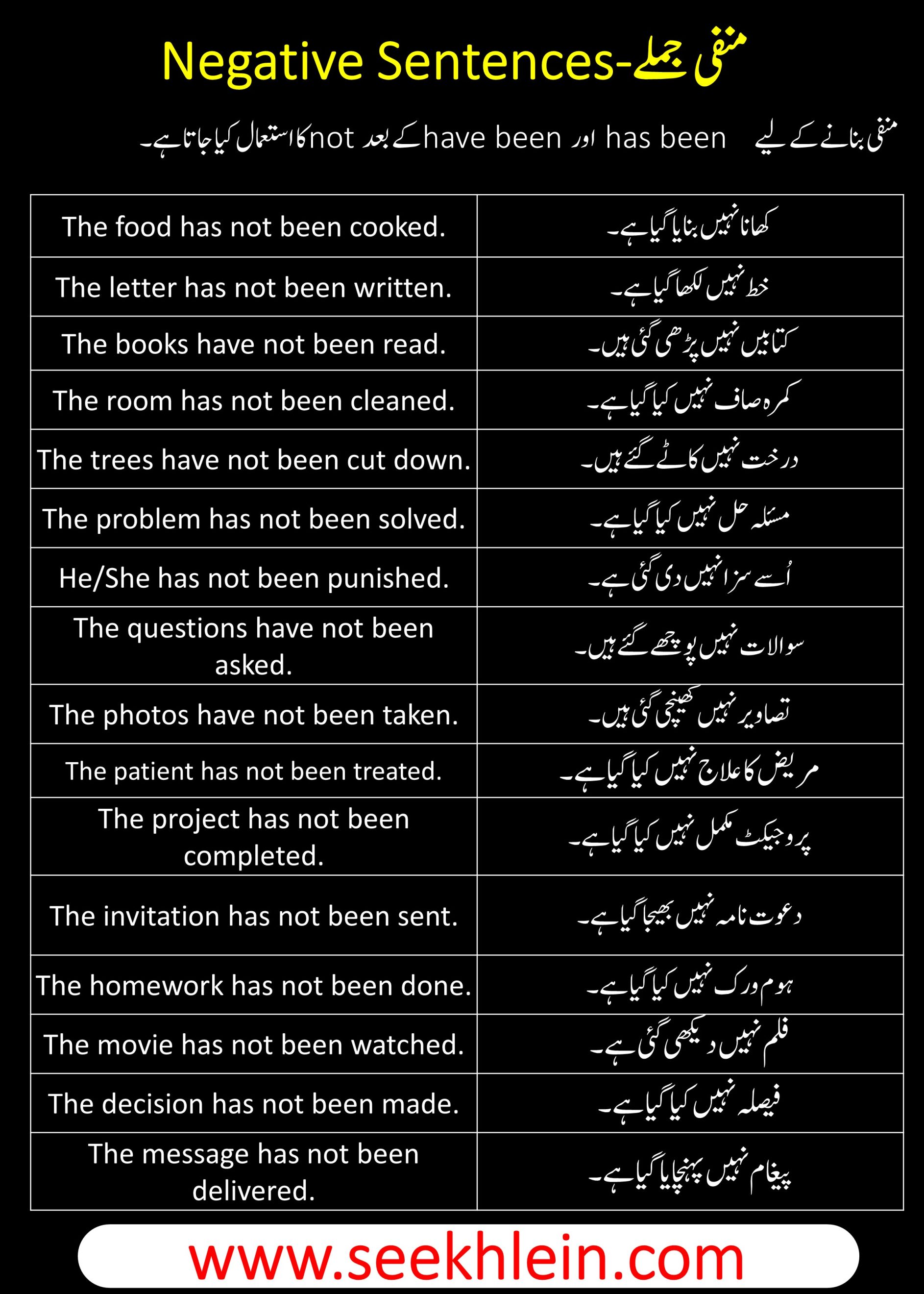
Present Perfect Passive Voice Tense With Negative Sentences Examples
Interrogative Sentences-سوالیہ جملے
سادہ سوالیہ بنانے کے لیے have been اور has been کو فاعل سے پہلے لگایا جاتا ہے
| Has the food been cooked? | کیا کھانا بنایا گیا ہے؟ |
| Has the letter been written? | کیا خط لکھا گیا ہے؟ |
| Have the books been read? | کیا کتابیں پڑھی گئی ہیں؟ |
| Has the room been cleaned? | کیا کمرہ صاف کیا گیا ہے؟ |
| Have the trees been cut down? | کیا درخت کاٹے گئے ہیں؟ |
| Has the problem been solved? | کیا مسئلہ حل کیا گیا ہے؟ |
| Has he/she been punished? | کیا اُسے سزا دی گئی ہے؟ |
| Have the questions been asked? | کیا سوالات پوچھے گئے ہیں؟ |
| Have the photos been taken? | کیا تصاویر کھینچی گئی ہیں؟ |
| Has the patient been treated? | کیا مریض کا علاج کیا گیا ہے؟ |
| Has the project been completed? | کیا پروجیکٹ مکمل کیا گیا ہے؟ |
| Has the invitation been sent? | کیا دعوت نامہ بھیجا گیا ہے؟ |
| Has the movie been watched? | کیا فلم دیکھی گئی ہے؟ |
| Has the message been delivered? | کیا پیغام پہنچایا گیا ہے؟ |
| Has the cake been baked? | کیا کیک پکایا گیا ہے؟ |
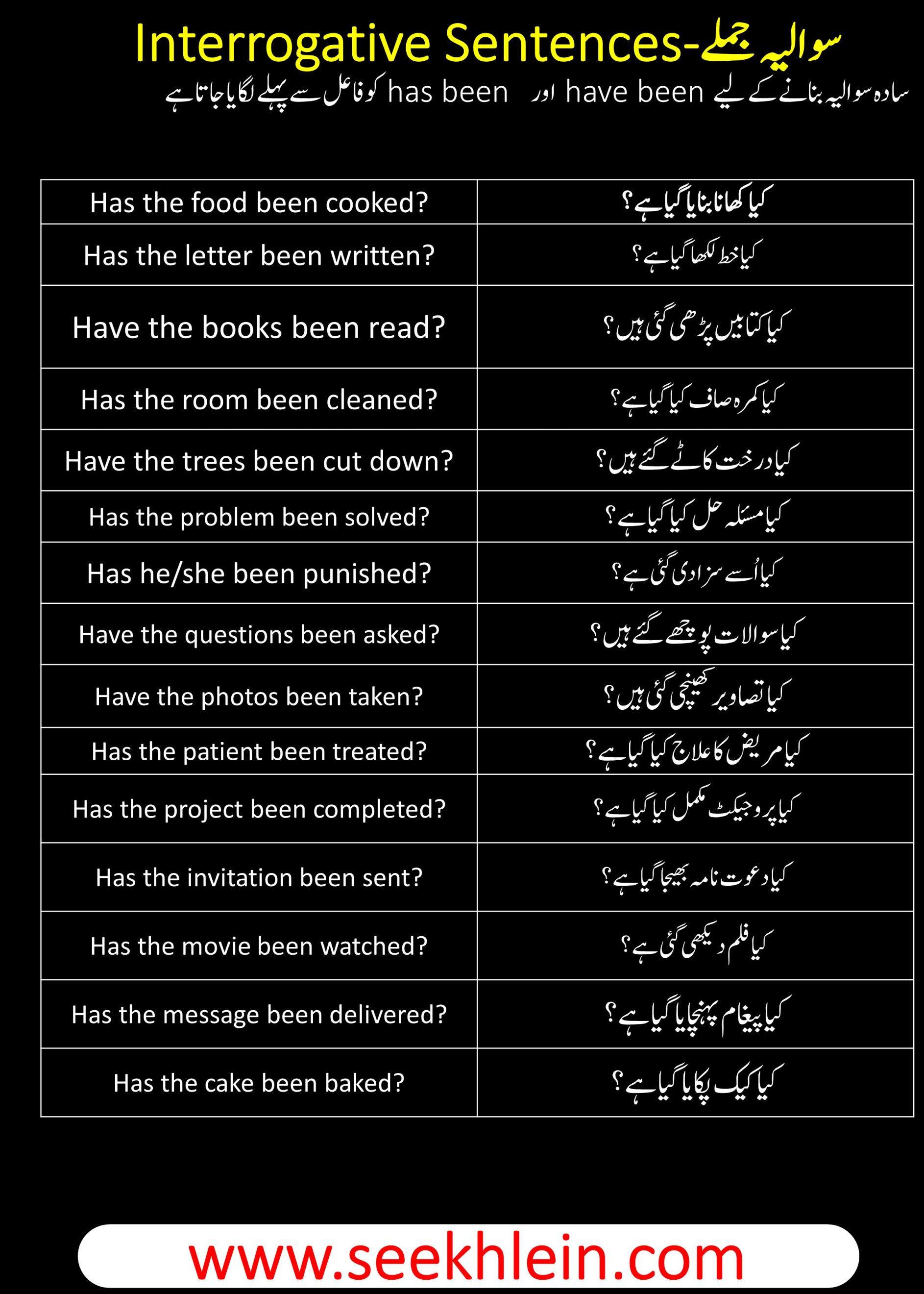
Double Interrogative Sentences-سوالیہ جملے
ڈبل سوالیہ بنانے کے لیےالفاظwho, why, what, when, where, howکو سادہ سوالیہ فقرات کےشروع میں استعمال کیا جاتا ہے۔
| Why has this decision been made? | کیا، کیوں یہ فیصلہ کیا گیا ہے؟ |
| Who has written this letter, and when? | کس نے، کب یہ خط لکھا گیا ہے؟ |
| Why and how has this problem been solved? | کیوں، کیسے یہ مسئلہ حل کیا گیا ہے؟ |
| By whom and when have these books been read? | کس کے ذریعہ، کب یہ کتابیں پڑھی گئی ہیں؟ |
| By whom and when has this message been delivered? | کس کے ذریعہ، کب یہ پیغام پہنچایا گیا ہے؟ |
| Why and how has this song been recorded? | کیوں، کیسے یہ گانا ریکارڈ کیا گیا ہے؟ |
| Who has sent this invitation, and when? | کس نے، کب یہ دعوت نامہ بھیجا گیا ہے؟ |
| For whom and when has this gift been purchased? | کس کے لیے، کب یہ تحفہ خریدا گیا ہے؟ |
| What car accident has been reported, and how? | کیا، کیسے یہ کار حادثہ رپورٹ کیا گیا ہے؟ |
| Who has received this award, and why? | کس نے، کیوں یہ ایوارڈ حاصل کیا گیا ہے؟ |
| When and where has this meeting been held? | کب، کس جگہ یہ اجلاس منعقد کیا گیا ہے؟ |
